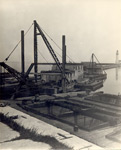Attack on Sacket's Harbor
- Publication
- Geneva Gazette (Geneva, NY), Wed., July 14, 1813
- Full Text
- ATTACK ON SACKET'S HARBOR.
Extract of a despatch from Brig. Gen. Brown, to the Secretary of War. dated Sacket's Harbor, June 1, 1813.
"In the course of the morning of the 28th, Lt. Chauncey of the navy, came in from the Lake, firing guns of alarm. Those of the same character, intended to bring in the militia, were fired from the posts. The enemy's fleet soon after appeared, accompanied by a large number of boats. Believing that he would land on the peninsula, commonly called Horse Island, I determined to meet him at the water's edge with such militia as I could collect, and the Albany volunteers, under the command of Lt. Col. Mills; Lt. Col. Backus, with the regulars, formed a second line; the care of Fort Tompkins was committed to the regular artilleries and some volunteers, and that of Navy Point to Lt. Chauncey of the Navy. If driven from my position, Lt. Col. Backus was ordered to advance and meet the head of the enemy's column, while rallying my corps; I was to fall on its flanks. If unable here to resist the enemy's attack, Lt. Chauncey was in that case to destroy the stores, &c. and retire to the south shore of the bay, east of Fort Volunteer, while I proceeded to occupy the fort as our dernier resource.
"In the course of the 28th and during the nights of the 28th and 29th ult. a considerable militia force came in, and were ordered to the water side near Horse Island, on which was Lt. Col. Mills and his volunteers. Our strength at this point was now five hundred men - all anxious for battle, as far as professions would go. The moment it was light enough to discover the approach of the enemy, we found his ships in line between Horse Island and Stony Point, and in a few minutes afterwards 33 large boats filled with troops, came off to the larger Indian or Garden island, under cover of the fire of his gun-boats. My orders were, that the troops should lie close and reserve their fire till the enemy had approached so near that every shot might hit its object. It is, however, impossible to execute such orders with raw troops unaccustomed to subordination. My orders were in this case disobeyed. The whole line fired, and not without effect - but in the moment while I was contemplating this, to my utter astonishment, they rose from their cover and fled. Col. Mills fell gallantly in brave but vein endeavors to stop his men. I was personally more fortunate. Gathering together about 100 militia, under the immediate command of Captain M'Nitt of that corps, we threw ourselves on the rear of the enemy's flank, and I trust, did some execution. It was during this last movement that the regulars under Col. Backus first engaged the enemy - nor was it long before they defeated him. Hurrying to this point of the action, I found the battle still raging, but with obvious advantage on our side. The result of the action, so glorious for the officers and soldiers of the regular army, has already been communicated in my letter of the 19th. Had not Gen. Prevost retreated more rapidly under the guns of his vessels, he would never have returned to Kingston.
"One thing in this business is to be seriously regretted. In the midst of the conflict, fire was ordered to be set to the navy barracks and stores. This was owing to the infamous conduct of those who brought information to Lt. Chauncey, that the battle was lost, and that to prevent the stores from falling into the enemy's hands, they must be destroyed. "The enemy's force consisted of 1,000 picked men, led by Sir George Prevost in person. Their fleet consisted of the new ship Wolfe, the Royal George, the Prince Regent, Earl of Moira, two armed schooners, and their gun and other boats."
(The following officers are stated to have distinguished themselves - Lt. Col. Backus, Capt. M'Nitt, Maj. Swan and Lt. Chauncey, of the Navy.)
"At the moment I am closing this communication, Commodore Chauncey has arrived with his squadron. This renders my longer stay here unnecessary. I shall therefore immediately return to my home. I am, sir, &c.
JACOB BROWN,
Brig. Gen. of the N.Y. militia.
The Hon. Gen. John Armstrong, Secretary of War."Gen. Brown states the aggregate loss in killed, wounded, &c. to be 156 men.
- Media Type
- Text
- Newspaper
- Item Type
- Clippings
- Date of Original
- Wed., July 14, 1813
- Subject(s)
- Local identifier
- GLN.4001
- Language of Item
- English
- Geographic Coverage
-
-
New York, United States
Latitude: 43.94923 Longitude: -76.12076
-
- Donor
- Richard Palmer
- Copyright Statement
- Public domain: Copyright has expired according to the applicable Canadian or American laws. No restrictions on use.
- Contact
- Maritime History of the Great LakesEmail:walter@maritimehistoryofthegreatlakes.ca
Website:


